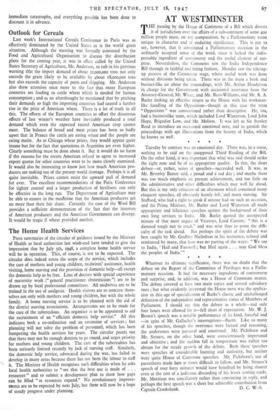Outlook for Cereals
Last week's International Cereals Conference in Paris was as effectively dominated by the United States as is the world grain situation. Although the meeting was formally convened by the Food and Agricultural Organisation to discuss the distribution plans for the coming year, it was in effect called by the United States Secretary of Agriculture, Mr. Anderson, to rub in his previous warning that the import demand of about 32,000,000 tons not only exceeds the grain likely to be available by about 18,000,000 tons but also exceeds the capacity of ports and shipping. Mr. Anderson also drew attention once more to the fact that. many European countries are feeding to cattle wheat which is needed for human consumption ; and as an afterthought he mentioned that by pitching their demands so high the importing countries had caused a further rise in the price of American wheat. There is a lot of truth in all this. The efforts of the European countries to offset the disastrous effects of last winter's weather have inevitably produced a total demand which even the expected record American crop cannot meet. The balance of bread and meat prices has been so badly upset that in France the cattle are eating wheat and the people are eating maize. As to Chicago wheat prices, they would appear quite insane but .for the fact that quotations in Argentina are even higher. Clearly something must be done about it. But it would do no harm if the reasons for the recent American refusal to agree to increased export quotas for other countries were to be more closely examined. It would also be interesting to know just how much American pro- ducers are making out of the present world shortage. Perhaps it is all quite inevitable. Prices cannot resist the upward pull of demand for ever. The excellent recommendations of the Paris Conference for tighter control and a larger production of fertilisers can only be effective in the long run. The Department of Agriculture may be able to ensure in the meantime that the American producers get no more than their fair share. Certainly the case of the Wool Bill provides a sufficient demonstration of the fact that the interests of American producers and the American Government can diverge. It would be tragic if wheat provided another.


































 Previous page
Previous page